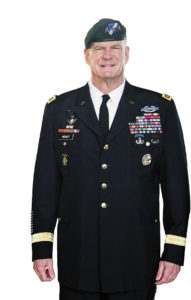The 2nd Mechanised Battalion “Pume“ (based in Našice) in early August welcomed new members for…
MSAP – the foundation for seamless joint operations
 You came to visit Croatia shortly after taking office. Is this event important for your term of office?
You came to visit Croatia shortly after taking office. Is this event important for your term of office?
I am extremely pleased that Bulgaria, Croatia, Hungary, and Slovenia have jointly succeeded in opening this Multinational Special Aviation Program Training Centre. I praise the Allies who built this dedicated training centre. This facility makes the delivery of a one-stop training opportunity in Europe more feasible and affordable, laying the foundation for seamless joint operations.
What are your expectations of the MSAP?
The aim of the Multinational Special Aviation Program (MSAP) is to provide training required to create and sustain Special Operations Aviation Units in an efficient and interoperable manner. Given NATO Special Operations Headquarters’ role in the inception of the project, we will continue involvement by providing support as the centre aligns with our focus on coordinating the development of special operations forces (SOF) capability and interoperability for Allies and NATO Partners.
What information have you received about Zemunik? What makes the base stand out?
Zemunik is an excellent location for the Multinational Special Aviation Program given the established military training infrastructure and support services, diverse geography including mountains, sea and islands coupled with the normally good flying weather. The infrastructure’s improvements are a sign of a well-coordinated national and multinational development plan. This sets an example for the Allies and facilitates further opportunities of cooperation.
– It seems that helicopters are an indispensable part of special operations.
Croatia is currently in the process of procuring Black Hawk helicopters. Do you expect that this technology will be included in the operations conducted by the MSAP?
Helicopters are a useful asset for Special Operations, and all helicopter crews supporting NATO missions and Special operations will gain technical and tactical experience from their training at the MSAP.
Have you already had professional contact with Croatian soldiers?
Croatia contributes personnel to my command and has done so with highly competent and professional Special Operations members. They also contribute to NATO’s effort in helping the Afghan security forces create the conditions for international peace and security. Additionally, Croatian Special Operations Forces provide key support to NATO’s KFOR mission as it creates stability, peace and protection to all communities in Kosovo.
What are your impressions of Croatian special forces and the aviators working with them?
My NATO Special Operations Headquarters Air Development Program team continues to value the support of Croatian special operations forces and aviators and know they will certainly make this programme a superb one. Cooperation with other countries and NATO SOF aviators will also provide the opportunity for better integration with land and maritime SOF units.
With what ambitions did you take over the helm of the NSHQ? What are your primary objectives?
NATO has kept our Alliance and its people safe by continuously adapting to new security challenges. The role NATO Special Operations Headquarters plays for the Alliance is key, and we must maintain focus on networking, interoperability, total defence, and on NATO land, sea and air SOF readiness to counter potential aggressors and terrorist threats.
Should member states of NATO intensify the sharing of their experiences when special forces and special operations are concerned?
There are unique operational benefits available through multinational cooperation and today is an example where the entire NATO SOF team looks forward to using this state of the art training centre. The Multinational Special Aviation Program and Training Centre is a demonstration of multinational cooperation through knowledge, skills and abilities that paves the way towards increased readiness and capability.
You have been in special operations forces for several decades and have taken part in many missions throughout the world. What was Your most difficult and most dangerous experience? Can one endure such a job and such a lifestyle for a long time?
Every time one deploys, there are challenges and hardships in some form or another. What remains constant is the importance of ensuring effective training, readiness, and unity of purpose. These are areas where NATO SOF contributes across the Alliance.
U.S. Army Special Forces and their operations enjoy great reputation. Do American strategies, techniques and doctrines dominate in NATO?
We are an Alliance bound by shared history, values and goals to prevent conflict and preserve peace for nearly one billion people. For seventy years, the bond between Europe and North America has made NATO the strongest Alliance in history. The Alliance relies on the shared strength of the 29 NATO nations whereby each nation adds value so that we are faster, more capable, and stronger by relying on each other and not dependent on a single country.
How do you envision the future of special forces and special operations? Will they take the place of “classic” military units in the future?
NATO is strong, and has made historic progress over the past few years adapting to a changing security environment. NATO SOF has and will continue to play a prominent role in ensuring the Alliance can effectively address the threats to the Euro-Atlantic security. NATO SOF’s contribution now and in the future complements. NATO’s capabilities across all domains. NSHQ is committed to improving the readiness of our forces to respond to any threat.
Croatian version:
